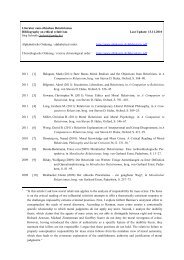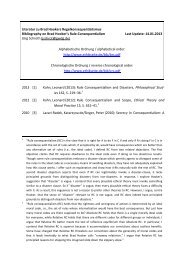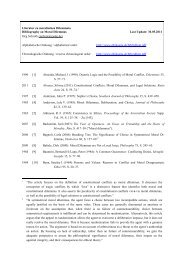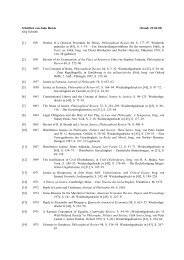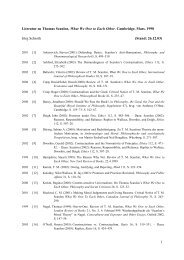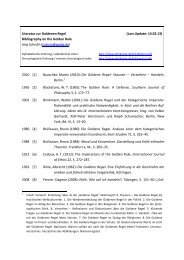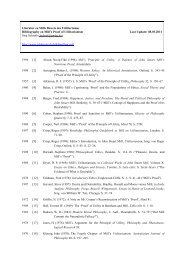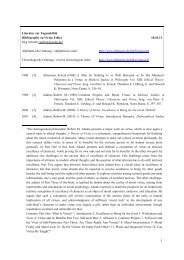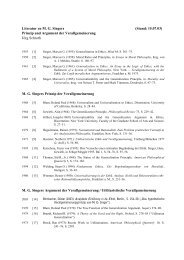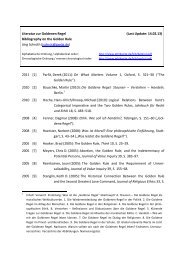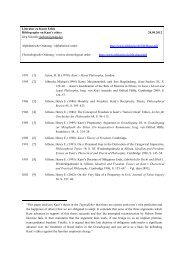Chronologische - Ethikseite
Chronologische - Ethikseite
Chronologische - Ethikseite
Create successful ePaper yourself
Turn your PDF publications into a flip-book with our unique Google optimized e-Paper software.
2004 [443] Horn, Christoph (2004): Die Menschheit als objektiver Zweck – Kants Selbstzweckformel des<br />
kategorischen Imperativs, in Kants Ethik, hrsg. von Karl Ameriks und Dieter Sturma,<br />
Paderborn 2004, S. 195–212.<br />
2004 [444] Howard, Jason J. (2004): Kant and Moral Imputation: Conscience and the Riddle of the Given,<br />
American Catholic Philosophical Quarterly 78, S. 609–29.<br />
2004 [445] Hruschka, Joachim (2004): Auf dem Wege zum Kategorischen Imperativ, in Metaphysik und<br />
Kritik. Festschrift für Manfred Baum zum 65. Geburtstag, hrsg. von Sabine Doyé,<br />
Marion Heinz und Udo Rameil, Berlin, New York, S. 167–81.<br />
2004 [446] Hruschka, Joachim (2004): The Permissive Law of Practical Reason in Kant’s Metaphysics of<br />
Morals, Law and Philosophy 23, S. 45–72.<br />
2004 [447] Johnson, Robert N. (2004): Kant’s Moral Philosophy, in Stanford Encyclopedia of Philosophy,<br />
hrsg. von Edward N. Zalta, http://plato.stanford.edu/entries/kant-moral/.<br />
2004 [448] Kain, Patrick (2004): Self-Legislation in Kant’s Moral Philosophy, Archiv für Geschichte der<br />
Philosophie 86, S. 257–306. 123<br />
2004 [449] Kersting, Wolfgang (2004): Vernunft, Verbindlichkeit und Recht bei Kant, in Kants Ethik,<br />
hrsg. von Karl Ameriks und Dieter Sturma, Paderborn, S. 269–90.<br />
2004 [450] Kim, Jong-Gook (2004): Kants Lügenverbot in sozialethischer Perspektive, Kant-Studien 95,<br />
S. 226–34.<br />
2004 [451] Kitcher, Patricia (2004): Kant’s Argument for the Categorical Imperative, Nous 38, S. 555–84.<br />
2004 [452] Klimchuk, Dennis (2004): Three Accounts of Respect for Persons in Kant’s Ethics, Kantian<br />
Review 8, S. 38–61.<br />
2004 [453] Krasnoff, Larry (2004): Pythagoras Enlightened: Kant on the Effect of Moral Philosophy,<br />
in New Essays on the History of Autonomy. A Collection Honoring J. B. Schneewind,<br />
hrsg. von Natalie Brender und Larry Krasnoff, Cambridge, S. 133–53.<br />
2004 [454] Kulenkampff, Jens (2004): Moralisches Gefühl oder moral sense: wie berechtigt ist Kants Kritik?,<br />
Jahrbuch für Recht und Ethik, Band 12, hrsg. von B. Sharon Byrd, Joachim<br />
Hruschka und Jan C. Joerden, Berlin, S. 233–51.<br />
2004 [455] Oberer, Hariolf (2004): Honeste vive. Zu Immanuel Kant, Die Metaphysik der Sitten, AA 06,<br />
236. 20–30, in Metaphysik und Kritik. Festschrift für Manfred Baum zum 65.<br />
123 “Kant famously insisted that “the idea of the will of every rational being as a universally legislative will” is<br />
the supreme principle of morality. Recent interpreters have taken this emphasis on the self-legislation of the<br />
moral law as evidence that Kant endorsed a distinctively constructivist conception of morality according to<br />
which the moral law is a positive law, created by us. But a closer historical examination suggests otherwise.<br />
Kant developed his conception of legislation in the context of his opposition to theological voluntarist<br />
accounts of morality and his engagement with conceptions of obligation found in his Wolffian predecessors.<br />
In order to defend important claims about the necessity and immediacy of moral obligation, Kant drew and<br />
refined a distinction between the legislation and authorship of the moral law in a way that precludes<br />
standard theological voluntarist theories and presents an obstacle to recent constructivist interpretations. A<br />
correct understanding of Kant’s development and use of this distinction reveals that his conception of<br />
legislation leaves little room for constructivist moral anti-realism.”



